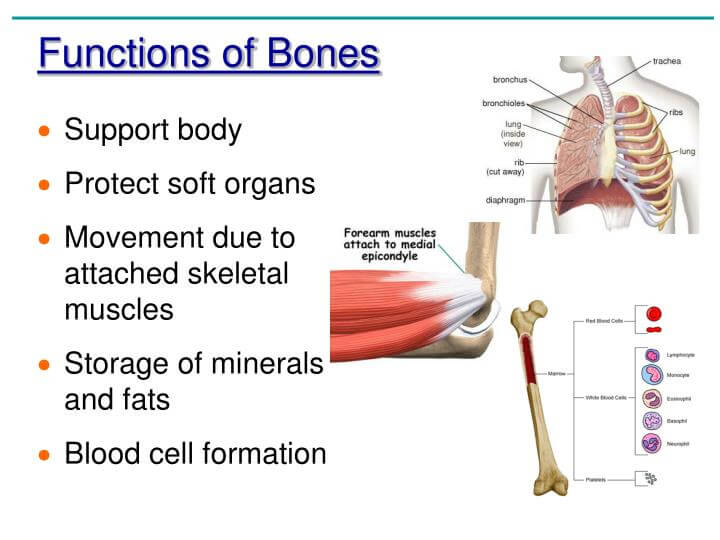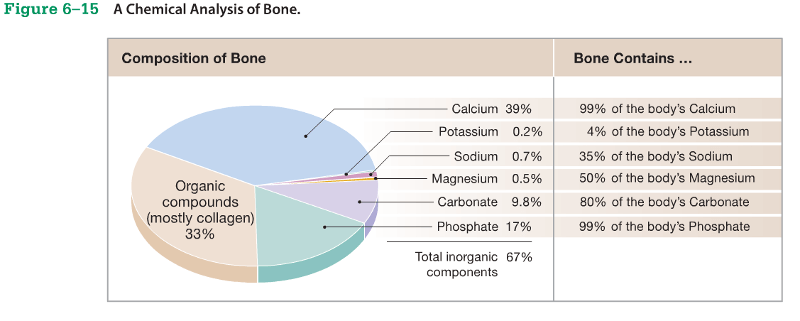
The Essential Purposes of Bones 
Bones are not just rigid structures in the body; they play several essential roles in maintaining overall health and functionality. Here are the key purposes of bones:
- Structural Support: Bones form the foundation of the body, providing support to muscles, tissues, and organs. They give us our shape and allow us to stand upright, maintain posture, and move.
- Protection of Vital Organs: Bones act as shields for many internal organs. The skull protects the brain, the ribcage guards the heart and lungs, and the vertebrae safeguard the spinal cord, reducing the risk of injury.
- Movement: By acting as levers and working with joints, bones enable movement. Muscles attach to bones, and when muscles contract, they pull on bones, allowing us to perform a wide range of movements.
- Mineral Storage: Bones serve as a reservoir for critical minerals like calcium and phosphorus. These minerals can be released into the bloodstream when needed to maintain mineral balance and support various physiological processes.
- Blood Cell Production: The bone marrow, located inside certain bones, is responsible for producing red and white blood cells as well as platelets, a process known as hematopoiesis.
- Endocrine Regulation: Bones also function as part of the endocrine system. They release hormones like osteocalcin, which helps regulate blood sugar levels and fat deposition.

The Composition of Bones
Bones are much more than just calcium. They are made up of a complex mineral matrix that provides strength, flexibility, and functionality.
Key Components of Bones:
- Calcium: The most abundant mineral in bones, primarily found in the form of calcium phosphate (hydroxyapatite), which gives bones their hardness.
- Phosphorus: Works with calcium to form hydroxyapatite, which is vital to bone structure.
- Magnesium: Helps regulate calcium balance and plays an essential role in bone formation.
- Sodium: Important for bone remodeling and mineralization.
- Potassium: Helps prevent calcium loss from bones.
- Zinc: Necessary for bone growth and mineralization.
- Iron: Involved in the synthesis of collagen, which is part of the bone matrix.
These minerals, combined with collagen fibers, form a structure that is both strong and flexible, allowing bones to support the body and withstand stress.
.
How to Ensure Healthy Bones
To keep bones strong, heal them when needed, and prevent degeneration, it’s crucial to consume foods rich in specific nutrients and minerals. Below are some essential nutrients for bone health and sources where you can find them:
- Calcium: Found in cheese, yogurt, raw milk, leafy greens, and sardines.
- Phosphorus: Available in meat, fish, poultry, dairy (raw preferred), nuts, and seeds.
- Magnesium: Can be sourced from pumpkin seeds, spinach, almonds, black beans, avocados, bananas, and whole grains.
- Vitamin D: Synthesized from sunlight exposure, and found in fatty fish like sardines and mackerel, as well as supplements like Super Vitamin D.
- Vitamin K2: Found in leafy greens, fermented foods, and eggs.
- Zinc: Present in meat, shellfish, pumpkin seeds, lentils, and whole grains.
- Boron: Available in avocados, prunes, raisins, almonds, and hazelnuts.
- Omega-3 Fatty Acids: Found in fatty fish like sardines and salmon, as well as chia seeds, flaxseeds, and walnuts.
- Collagen: Found in bone broth, gelatin-rich foods, collagen supplements, and colostrum supplements.
Avoiding Bone-Damaging Substances
While consuming the right nutrients is important, it’s equally vital to avoid substances that can harm bones. Excessive sodium can lead to calcium loss, and high sugar intake can interfere with nutrient absorption. Keep these two substances in check to protect bone health.
 Supplementation for Bone Health
Supplementation for Bone Health
In addition to a nutrient-rich diet, supplementation may help fill in any nutritional gaps:
- Mineral Essence: A blend of ionic minerals for overall mineral balance.
- BLM (Bones, Ligaments, Muscles): A supplement to support musculoskeletal health.
- Sulfurzyme: Helps in the recovery and repair of bones and joints.
- NingXia Red: Rich in antioxidants, it supports overall health and vitality.
- Super Magnesium: Essential for bone strength and calcium regulation.
Essential Oils That Support Bone Healing and Repair
Certain essential oils may also promote the healing and repair of bones:
- Wintergreen: Known for its soothing properties.
- Idaho Grand Fir: Supports bone and joint health.
- Clove: Rich in antioxidants that may help with bone repair.
- Helichrysum: Supports tissue healing.
- Pine: Promotes bone strength.
- Lemongrass: Known to help in tissue repair.
By following these dietary and lifestyle tips, you can maintain strong, healthy bones throughout your life. Supplementation, balanced nutrition, and mindful practices are the keys to long-term bone health and vitality.
Until next time,
Rochelle














0 Comments